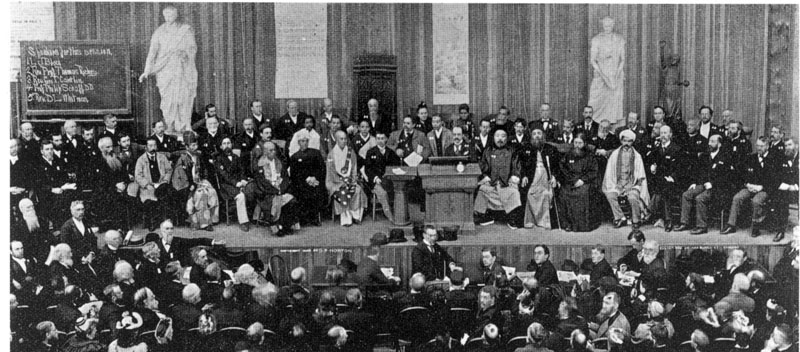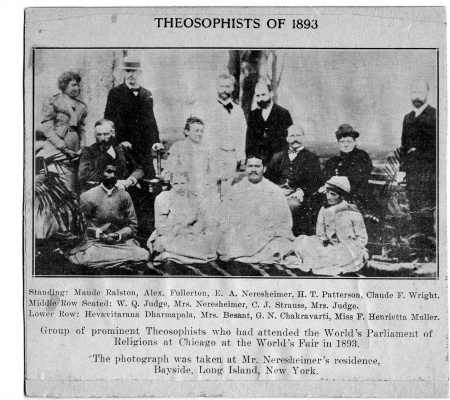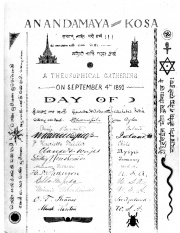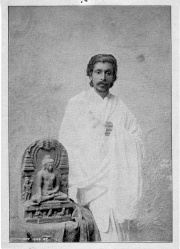World's Parliament of Religions (1893): Difference between revisions
Pablo Sender (talk | contribs) No edit summary |
|||
| Line 65: | Line 65: | ||
</blockquote> | </blockquote> | ||
== Theosophists | == Theosophists attending the Parliament == | ||
[[File:Theosophists of 1893.jpg|450px|thumb|Theosophists<br>assembled before<br>Parliament]] | [[File:Theosophists of 1893.jpg|450px|thumb|Theosophists<br>assembled before<br>Parliament]] | ||
[[File:Document signed by 1893 theosophists.jpg|180px|right|thumb|Document<br>signed by Theosophists<br>Sept. 4, 1893]] | [[File:Document signed by 1893 theosophists.jpg|180px|right|thumb|Document<br>signed by Theosophists<br>Sept. 4, 1893]] | ||
[[File:Dharmapala at Parliament.jpg|180px|thumb|Anagarika Dharmapala]] | [[File:Dharmapala at Parliament.jpg|180px|thumb|Anagarika Dharmapala]] | ||
Members of the [[Cincinnati Theosophical Society]] had an excursion to Chicago on September 15-17, traveling on the Cincinnati, Hamilton and Dayton Railroad at a cost of $7.00 per person. The lodge had a foretaste of the Theosophical Congress on Saturday, September 9, when [[William Quan Judge]], [[Annie Besant]], and [[G. N. Chakravarti|Professor Chakravarti]] made a stop in Cincinnati on their way to Chicago and lectured at the dedication of the new Theosophical Hall. Of the Parliament, Dr. Buck briefly recounted that: | |||
<blockquote> | |||
all of the meetings were largely attended and that the platform of the World's Congress of Religions was exactly that of the Theosophical Society in that the latter had for its object the establishment of a nucleus for the Universal Brotherhood of Man and desired to demonstrate the one common basis of all religions."<ref>Minute Book of the Cincinnati Theosophical Society. September 5-19, 1893. Cincinnati Theosophical Society Records. Records Series 20.02.01. Theosophical Society in America Archives.</ref> | |||
</blockquote> | |||
Frederick J. Kunz and his large family from Freeport, Illinois were in attendance, except for the youngest son, [[Fritz Kunz]], who was only five years old. Afterward, the entire household joined the Theosophical Society and became the mainstay of the Freeport Lodge. Fritz often spoke of his disappointment at missing the trip to Chicago.<ref>Kunz Family Collection. Records Series 25.01. Theosophical Society in America Archives.</ref> | |||
== Notes == | == Notes == | ||
Revision as of 16:55, 22 May 2014
The World's Parliament of Religions was an event held September 11-27, 1893, in Chicago, in conjunction with the World Columbian Exposition. It heralded the birth of a worldwide interfaith dialogue that has continued with the Parliament of the World's Religions in 1993, 1999, 2004, and 2007.
Theosophical Program at the Parliament
According to the Supplement to The Theosophist in September, 1893:
The following programme will be carried out on September 15th and 16th next, the two days set aside for Theosophy at the Parliament of Religions at Chicago: -
I. THEOSOPHY DEFINED.
- 1. The theosophical Doctrine of the Unity of all Spiritual Beings.
- 2. The Eternal Unity of Spirit and Matter.
- 3. Theosophy is a System of Truths, discoverable and verifiable by perfected men.
- 4. These Truths are preserved in their purity by the Great Brotherhood of Initiates, the Masters of Wisdom, who promulgate them more and more fully as the evolution of man permits.
II. THEOSOPHY HISTORICALLY CONSIDERED, AS THE UNDERLYING TRUTH OF ALL THE WORLD'S SCRIPTURES, RELIGIONS AND PHILOSOPHIES.
- 1. As found in the Sacred Books of the East and of Egypt.
- 2. As found in the Hebrew Books, and in the New Testament of the Christians.
- 3. As found in Greek and Gnositic Philosophy.
- 4. As found in European Mediaeval Philosophy.
- 5. As found in European Mysticism.
- 6. Esotericism in Religions.
- 7. Links between Religion and Science.
- 8. Revelation not a special property of any one religion.
- 9. The Secret Doctrine and its Guardians.
III. THE PHILOSOPHY AND PSYCHOLOGY OF THEOSOPHY.
- 1. The Cosmos Septenary in its Constitution.
- 2. Man, the Mirror of the Cosmos and Thinker.
- 3. The Inner and the Outer Man.
- 4. States of Consciousness.
- 5. Evolution of the Soul.
- 6. Karma, the Law of Causation, of Justice and Adjustment of Effects.
- 7. Reincarnation of the Soul a Law of Nature.
- 8. The Doctrine of Universal Brotherhood as a fact in Nature.
- 9. The Theosophical View of Death.
- 10. Man, a Sevenfold-Being, thus corresponding to the Cosmos.
IV. THE THEOSOPHICAL MOVEMENT IN ITS ORGANIZED LIFE.
- 1. The Objects of the Theosophical Society.
- 2. Its Relation to Civic Affairs and Education.
- 3. The Mission of the Theosophical Society.
- 4. The Constituted Methods of Administration and Work, the conduct of Branches and their Autonomy; Propaganda.
- 5. The Society absolutely Unsectarian, without a creed, and open to persons of all faiths. Acceptance of doctrines largely taught in Theosophical Literature not incumbent; Universal Brotherhood the only theory required to be embraced.
V. THEOSOPHY AND MODERN SOCIAL PROBLEMS.
- 1. Its insistence on Justice and Unselfishness as the basis of Community Life.
- 2. Its doctrine of Evolutionary Reincarnation as applied to the Sexes.
- 3. Its claim that social evils have their roots in mental faults, and that in addition to legislative, educational, and social improvements, the truths and laws of being must be taught for the fundamental regeneration of society, and the recognitition of Karma and Reincarnation must be made the basis of concerted public, as well as of private, efforts.
VI. THEOSOPHY AND SCIENCE.
- 1. Theosophy hostile to science only when Materialistic, when it repudiates all spheres and processes other than physical, or denies the reality of soul and spirit and the unseen universe.
- 2. Theosophy, as a Universal Philosophy, appropriates all spheres of being and claims a scientific investigation of each.
- 3. The sanction of Right Ethics found in Universal Brotherhood as a fact and not merely a sentiment; enforcement of right ethics found in the power which the knowledge of karma and Reincarnation has on the individual.
- 4. Theosophy offers no new sytsem of right ethics, since right ethics do not vary but are always the same as taught by all great religious teachers.[1]
Theosophists attending the Parliament
Members of the Cincinnati Theosophical Society had an excursion to Chicago on September 15-17, traveling on the Cincinnati, Hamilton and Dayton Railroad at a cost of $7.00 per person. The lodge had a foretaste of the Theosophical Congress on Saturday, September 9, when William Quan Judge, Annie Besant, and Professor Chakravarti made a stop in Cincinnati on their way to Chicago and lectured at the dedication of the new Theosophical Hall. Of the Parliament, Dr. Buck briefly recounted that:
all of the meetings were largely attended and that the platform of the World's Congress of Religions was exactly that of the Theosophical Society in that the latter had for its object the establishment of a nucleus for the Universal Brotherhood of Man and desired to demonstrate the one common basis of all religions."[2]
Frederick J. Kunz and his large family from Freeport, Illinois were in attendance, except for the youngest son, Fritz Kunz, who was only five years old. Afterward, the entire household joined the Theosophical Society and became the mainstay of the Freeport Lodge. Fritz often spoke of his disappointment at missing the trip to Chicago.[3]
Notes
- ↑ "Theosophy in the Parliament of Religions," Supplement to The Theosophist 14:12 (September, 1893), lxxxix-xc. Available online at Theosopher.net.
- ↑ Minute Book of the Cincinnati Theosophical Society. September 5-19, 1893. Cincinnati Theosophical Society Records. Records Series 20.02.01. Theosophical Society in America Archives.
- ↑ Kunz Family Collection. Records Series 25.01. Theosophical Society in America Archives.
Online resources
Articles
- Theosophical Doctrine by William Q. Judge
- Theosophy Generally Stated by William Q. Judge



